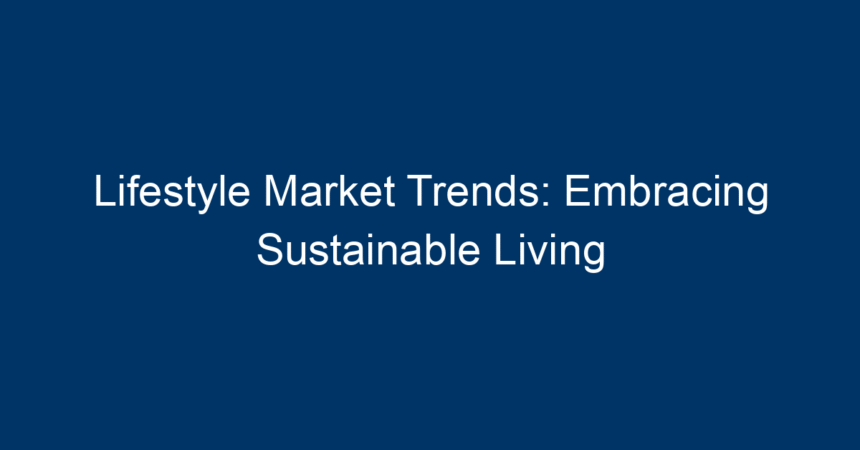In recent years, the concept of sustainability has transitioned from niche to mainstream, radically reshaping lifestyle market trends. As consumers grow increasingly aware of their impact on the environment, they are aligning their buying habits with their values. This shift towards sustainable living manifests in various forms, from zero-waste shopping to eco-friendly fashion. In this article, we will delve into the current lifestyle market trends centered around sustainable living, explore the underlying motivations driving these changes, and provide actionable insights for businesses and individuals alike.
Understanding the Shift Towards Sustainability
The Rise of Eco-Conscious Consumers
With climate change, pollution, and biodiversity loss dominating headlines, consumers are re-evaluating their lifestyle choices. A large segment of the population—particularly millennials and Gen Z—actively seeks out brands that prioritize environmental and social responsibility. This demographic not only values product quality but also places a significant emphasis on ethical production practices and transparency.
The Impact of COVID-19
The COVID-19 pandemic has further accelerated lifestyle market trends towards sustainability. Lockdowns highlighted the fragility of supply chains and drew attention to issues like plastic waste from single-use items. Consumers began to reassess their consumption habits, leading to an increased demand for sustainable alternatives, including locally sourced products and eco-friendly packaging.
Key Lifestyle Market Trends Emphasizing Sustainable Living
1. The Growth of Eco-Friendly Products
In recent years, the availability of eco-friendly products has skyrocketed. From biodegradable household supplies to sustainably produced skincare, more brands are entering the market with environmentally friendly solutions. Consumers are now opting for products that minimize harm to the planet, and this trend is evident across various sectors, including food, fashion, and home goods.
Popular Categories
- Food: Organic, plant-based, and locally sourced options are becoming staples in grocery stores. Brands like Beyond Meat and Oatly exemplify this shift.
- Fashion: Sustainable fashion brands like Reformation and Everlane are making waves as consumers turn away from fast fashion.
2. Minimalism and Zero-Waste Living
Another trend gaining traction is minimalism, which emphasizes simplifying life by reducing excess. Alongside this is the zero-waste movement, which advocates for eliminating waste at the source. Individuals are adopting practices such as:
- Bulk Shopping: Purchasing in bulk reduces packaging waste.
- DIY Alternatives: Many are turning to do-it-yourself recipes for household cleaners, beauty products, and food items.
The Minimalism Movement
The minimalism trend encourages consumers to invest in fewer, higher-quality items that have longevity, creating less waste and promoting a sustainable lifestyle.
3. Green Technology
Advancements in technology are making sustainable living more accessible. Smart home devices, electric vehicles, and energy-efficient appliances are becoming commonplace. Particularly noteworthy is the rise of renewable energy sources—solar panels and wind turbines are now mainstream considerations for homeowners looking to reduce their carbon footprint.
4. Sustainable Travel
As travel resumes post-pandemic, the industry is leaning towards sustainability, driven by demand from conscious travelers. Trends in sustainable travel include:
- Eco-Tourism: Destinations that prioritize conservation efforts are on the rise.
- Carbon Offsetting: Travelers are increasingly purchasing carbon offsets to mitigate their travel footprints.
- Local Experiences: Many are choosing to immerse themselves in local cultures over traditional tourist activities to foster genuine connections and support local economies.
The Role of Brands in Promoting Sustainable Living
Building Authenticity Through Transparency
Brands that wish to thrive in today’s lifestyle market trends must prioritize authenticity. Transparency regarding sourcing, production practices, and corporate social responsibility can foster customer loyalty. Conscious consumers appreciate brands that openly share both their commitment to sustainability and any challenges they face in achieving their goals.
Collaborations with Sustainable Initiatives
Brands can also engage in partnerships with environmental organizations, further convincing consumers of their commitment to sustainability. Collaborating on initiatives such as beach cleanups or reforestation projects not only helps the planet but enhances brand reputation.
The Importance of Circular Economy Models
Adopting circular economy models allows brands to take responsibility for their products beyond the point of sale. Businesses can implement take-back schemes, where customers return used products for recycling or refurbishing, fostering a relationship of trust and sustainability.
Actionable Insights for Individuals
Make Conscious Choices
Individuals can adopt more sustainable living practices by:
- Researching Products: Educate yourself about brands’ sustainability practices.
- Support Local: Whenever possible, purchase from local artisans and farmers.
- Reduce Single-Use Items: Carry reusable bags, water bottles, and utensils to limit waste.
Advocate for Change
Become an advocate for sustainable living in your community by:
- Participating in Local Initiatives: Get involved in local sustainability projects or community cleanups.
- Educating Others: Share information about sustainable practices through social media or community workshops.
Embrace a Learning Mindset
Stay informed about ongoing lifestyle market trends by following sustainability blogs, podcasts, and documentaries. Engage in conversations about sustainability to expand your understanding and inspire others.
Conclusion: A Collective Effort Towards a Sustainable Future
The lifestyle market trends towards sustainable living reflect a collective awakening to the importance of protecting our planet. As consumers, businesses, and communities embrace sustainability, each small change contributes to a larger movement towards a healthier, more sustainable world.
By adopting eco-friendly products, minimizing waste, supporting green tech, and participating in local efforts, individuals can play a pivotal role in this transformation. As we navigate these exciting trends, let’s remember that every action counts, and together, we can create a more sustainable future for generations to come.
This comprehensive exploration of lifestyle market trends emphasizes the growing importance of sustainability, offering insights for both consumers and brands alike. For those eager to contribute to the sustainable living movement, the journey begins with informed choices and collective action.




